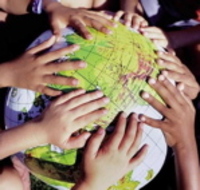My 2020 Vision for Global Collaboration

I have been reflecting on global collaboration and what it means for teachers, students and the wider community. I have also been reflecting on sustainability of online spaces and how much of what we are ‘producing’ in terms of creative output has not been preserved over the past 15 years. Let me be more specific.
For the past 12 years I have participated in online global projects with my students. In 1996, my school in Australia, Eltham College, received an Honorable Mention in the Environmental Awareness section of the International Cyberfair project (organised by the Global School Net). This project had an amazing affect on our school community. To be able to publish images, sounds (yes, we even got up at dawn and recorded the Australian bird song as the day begins to upload), ideas and thoughts from our part of the world and share them internationally was an amazing achievement in the early days of he Internet. In fact many of us got up at 5am (pre-dawn!) to come to school and listen to the Cyberfair awards ceremony that year (at a reasonable time in the USA of course) that included an opening address from Al Gore. Those were the days. Alas, the website for this project is gone, changes in school server and ISP hosting etc etc have deleted it long ago.
In my first 5 years as an international educator I ran Learning Circle projects with classes in Zambia and Kuwait as part of the iEARN initiative. These involved grouping 6 or so classrooms from around the world into a ‘project’ that was self-determined according to curriculum section. The outcome from the interaction was often a hard-copy publication or a website. I still have two of the ‘books’ produced during these years with students writings and ideas from the various international locations. I am excited to see that iEARN are now in Qatar and promoting collaborative projects in this region.
When I moved to Bangladesh and International School Dhaka we participated in the 2004 international School’s Cyberfair and won the Platinum (first prize) in the Environmental Awareness section for Poribesh Bachan (Bangla for being aware, taking action). Once again this was a community project and we had great fun compiling images and records of the current environmental state of Dhaka and initiatives that were moving it forward at that time. Alas, this website is not available online anymore.
In the past 18 months I have been a co-founder (with Vicki Davis) of the Flat Classroom Project and Horizon Project and global collaboration as I knew it suddenly took on a whole new dimension. I have written about this new ‘Global Collaboration 3.0‘ earlier however let me make some salient points here as to why we now have a whole new focus for online collaborative projects and what that means for education.
- Web 2.0 has changed the online world making interaction and collaboration easier. Instant publication via a wiki, social networking via a Ning (see flat classroom Ning) have brought people (teachers and students) together as they have never been before
What is my 2020 Vision for global collaboration? (thanks to Karl Fisch for his inspiration and for being the Keynote speaker for Horizon Project 2006)
- Global collaborative projects need to be embedded into the curriculum. We need to be looking at how students can have experiential learning opportunities at all levels of education. As a middle and high school specialist I expect my students to have had at least one global project experience before they leave Primary school, and then to have at least one global project experience each year of middle and high school. I do not think this is unreasonable or unrealistic
I have a strong belief in the power of online connectivity and global collaboration (in all of it’s many forms) at the school level to make a difference to the world we live in through fostering better understanding and cultural awareness. These are not just words. I have seen this happen through the projects I have run with my own classes.
What is your 2020 vision for global collaboration? Do you have a global collaboration on your horizon?
I invite you to join our Flat Classroom Ning, Horizon Project Ning and also to have a look at our current project just starting, Horizon Project 2008, where we have 11 classrooms and over 250 students from Australia, Austria, Japan, Spain, Qatar and the USA.
Julie Lindsay, guest blogger

Technorati Tags: flatclassroomflatclassroomprojecthorizonprojecthorizonproject2008iearnglobalschoolnetcyberfairningwikispaceskimcofinokarlfischvickidavis




